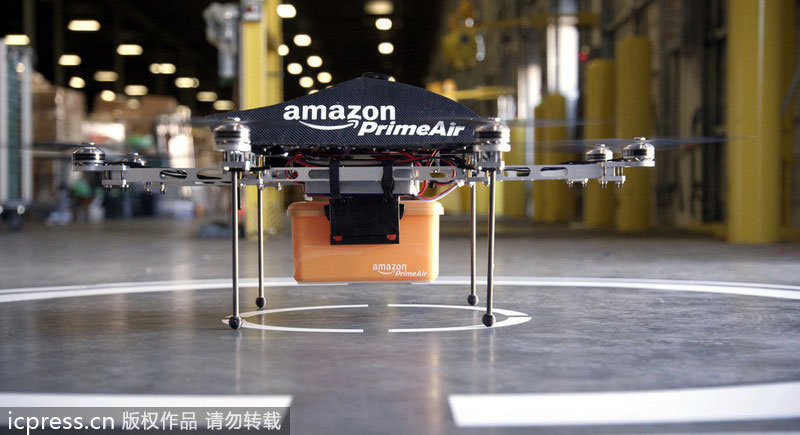
 |
|
Amazon's "Prime Air" will provide delivery service using drones, which can bring goods up to 5 pounds (2.3 kg) to customers in 30 minutes or less if they are within a 16-km radius of Amazon's so-called fulfillment centers, said CEO Jeff Bezos. Field testing will begin in Sydney next year, and delivery drones will be promoted within three or four years if all goes well. [Photo/icpress.cn] |
Safety, privacy concerns
The idea of deliveries by unmanned vehicles is not completely new. Tech news site the Verge reported last month that Australian textbook rental firm Zookal plans to use drones to deliver books in that country next year, possibly expanding the service to the United States later.But that company, and Bezos, are up against a raft of real-world challenges.
The UK-based Institution of Engineering and Technology (IET) immediately warned that the technology needs refinement.
"There are many challenges to overcome," said the IET's Lambert Dopping-Hepenstal, who is pushing for wider use of unmanned aircraft worldwide. "Top of the list is the need to mature the technologies and demonstrate to the regulators that unmanned aircraft can operate safely in our airspace."
US authorities have recognized the commercial applications of drones, but appear to be in no hurry to set the rules. The FAA currently only allows the use of unmanned aircraft systems (UAS) by public entities on a case-by-case basis.
"Over the next several years the FAA will establish regulations and standards for the safe integration of remote piloted UAS to meet increased demand," the FAA said in an e-mailed statement on Monday.
The FAA plans to begin tests on commercial UAS by the end of this year and to propose a rule for small craft next year, which means no firm regulations will be set before 2015. So far, only a single commercial UAS operator has been approved, in the Arctic.
Broader reaction to Bezos' plan was mixed.
Mark Udall, a Democrat Colorado senator who is pushing legislation that would outlaw domestic surveillance by UAS, raised concerns about privacy.
"Coloradans will accept this technology only if they are certain their privacy is protected and that Americans won't be victims of surveillance or privacy abuse by private unmanned aerial system operators," he said in a statement.
Richard Aboulafia, an aerospace industry expert and analyst at Teal Group, was more blunt.
"It's such an appallingly dumb idea that I presume they're talking about it as a form of clever satire," he said on Monday.